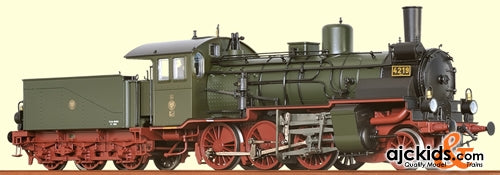Brawa 40452 - Steam Locomotive G5.4 K.P.E.V. Digital Sound
Steam Locomotive G5.4 K.P.E.V.
Road no. Halle 4219
Shortly before the turn of the century, the six-coupled locomotive had also reached its performance limits in Prussia. The growing number of passenger trains and their increasing speed lead to fewer and fewer routes for slow freight trains on frequently used lines. For this reason, ways of speeding up freight trains were sought, which was only possible however with more powerful locomotives. However, more power could not be achieved on the six-coupled running gear, so that a way out was sought with a leading running axle. With the &ldquo, Hanover 800&rdquo,, Vulcan delivered the first G5.1 in 1892, which essentially had the two-cylinder engine of the G4, supplemented with a leading Adams axle. The boiler to be installed on this was dimensioned more generously, so that the grate area was increased by 50% compared with the G4. Already in 1896, the G5.1 was converted to a saturated steam compound engine and purchased in parallel with the G5.1 with the designation G5.2. As the running characteristics of the Adams axle were not satisfactory, it was replaced with a Krauss-Helmholtz bogie with which the compound engine was equipped from 1901 onwards and designated as G5.4. The &ldquo, twin engines&ldquo, only benefited from this measure from 1903 onwards. However, the maximum speed of all locomotives was 65 kph. Although the saving on coal of the compound engine was not that high and they were therefore preferably to be used in &ldquo, coal-remote&rdquo, divisions, they were most frequently purchased by the divisions of the KPEV. Up to 1910, BMAG, Borsig, Grafenstaden, Hanomag, Henschel, Hohenzollern and Humboldt delivered 780 of these locomotives. The G5.4 were used in almost all Prussian divisionsstrongholds with more than 100 engines were for example Altona, Halle and Hanover. They were mainly used for &ldquo, fast freight transport&rdquo, . However, there were also scheduled service pulling passenger trains. This is mentioned separately in many stock lists because the locomotives had to have a compressed air brake for this. In contrast, the freight trains still had handbrakes at this time. In addition to the KPEV, the &ldquo, Royal Military Railway&rdquo, (1), the MFFE (9), the port railway Frankfurt (3) and the LBE (3) had locomotives of class G5.4. A great decimation of the stock was carried out by the Treaty of Versailles &ndash, of the G5.4, Prussia alone had to surrender 368 to the victorious powers of the First World War. The largest contingents were given to Poland (191 engines) and Belgium (100). The renumbering plan of 11.12.1925 contained 281 G5.4 of which 218 engines were definitely renumbered as BR 54.8-10 in 1926.
Delivery date: July / August 2010
EAN/UPC: 4012278404523



